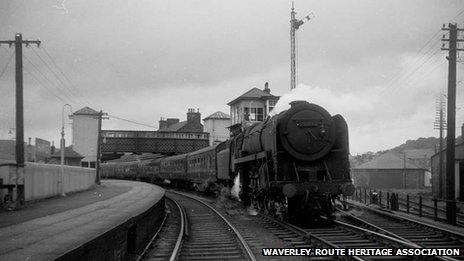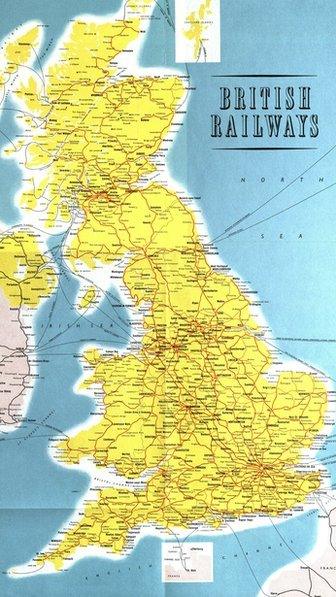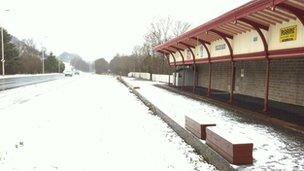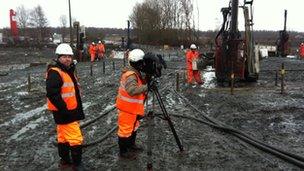Did Dr Beeching get it wrong with his railway cuts 50 years ago?
- Published

Services from Edinburgh to Carlisle, via the Scottish border towns of Galashiels and Hawick, stopped when the Waverley line closed
Fifty years ago, the Beeching Report was published, spelling the end for thousands of stations and hundreds of branch lines. But now, in one corner of Britain, a new line is being laid that will restore a link cut by Beeching's axe.
I still find it incredible that half a century after a rather grey civil servant from the Isle of Sheppey wrote his report about our trains, Dr Beeching remains one of the most famous, or should that be infamous, bad guys in British history.
Then again, his bland-looking booklet, called the Reshaping of British Railways, did change the network forever.
Beeching was recruited by the government from a very successful business career at ICI, to make the railways profitable again. By the early 1960s the industry was bleeding millions of pounds a year. His solution was simple - close down the bits that lost the money.

In 1963, at the time of the Beeching report, railways criss-crossed Britain, and even remote areas had stations
The Beeching report recommended taking an axe to about a third of the network - 5,000 miles of track, including hundreds of branch lines, 2,363 stations and tens of thousands of jobs.
Instead, it would concentrate on the things trains did well. Fast journeys between the cities.
Improved bus services could replace branch lines, argued Dr Beeching.
In a public information film at the time he said: "On one half of the whole route mileage of British Railways, there is only one 20th of the traffic... the real question is whether you, as owners of the railways, want us to go on running these services at very high cost when the demand for them has very largely disappeared."
The report was explosive.
Blood boiling
Even today the name Beeching can get some people's blood boiling.
I met a famous trainspotter from Sheffield at an event to "celebrate" the 50th anniversary of Beeching's report.
I asked Michael Palin, the former Monty Python star who later carved out a career travelling the world, often by train, whether he thought Beeching was a hero or a villain.
He said: "Definitely villain, to me, but then I always have been a huge supporter of railways. There was something about the scale and the brutality of the attack that I remember at the time made me feel that this is wrong."
His memories echo so many others from the time, as the Beeching axe left its mark across Britain.
Palin told me: "My father... travelled to London regularly on an express called the Master Cutler, which went from Sheffield to Marylebone, well that line suddenly disappeared.
"The line through from Sheffield to Manchester where we lived and grew up, which had the great Woodhead tunnel, one of the longest tunnels in the world, three miles long, the tunnel was closed while they built a motorway over the Pennines. It had very profound effects in our city," he added.

Ironically a bypass for cars has replaced the railway at Melrose station in the Scottish borders
But does Dr Beeching really deserve his reputation as the bogeyman of the railways?
Arguably not.
For starters, he took over an old network that was losing a lot of money.
And the line closures began long before the Beeching report.
More than 3,000 miles disappeared in the 1950s and the government wanted to axe a lot more.
"Beeching has become a handy scapegoat for our frustration at the failings of the transport system and the destruction of 'traditional' branch line England by modern car culture," said Charles Loft, author of Last Trains, Dr Beeching and the Death of Rural England.
But he added: "The real instigators of rail closures were civil servants trying to work out how you adapt a country that was built around the horse and cart and steam train, to accommodate the cars people wanted to drive and the lorries business wanted to use."
'Bad press'
He is backed up by the man running the railways today, Network Rail boss Sir David Higgins.
He told me: "Beeching has had a really bad press... the reality is he made the tough decisions that anyone in that position would probably have had to make, the shame was it wasn't followed on with investment in the subsequent decades after that."
True, he took a clinical, bean-counting approach to the problem. But that is what he was meant to do.
He is often criticised for ignoring the social benefits of having a rail line.
There are doubts over his figures and in the end the railway never did make the savings he promised. But Dr Beeching did not cut the rail lines - successive government ministers did, and they would undoubtedly have cut the network anyway, report or no report.

Work is under way on a new £300m railway between Edinburgh and Tweedbank
Back then most people assumed that cars, lorries and buses were the future. And they were right.
These days nine out of 10 passenger journeys are by road. But what no-one foresaw was the role railways would play in the modern world.
Today, record numbers are taking the train despite the recent recession.
I have just come back from Scotland, where we braved blizzards to film the new £300m Borders line, which they have just started building between Edinburgh and Tweedbank.
Well, I say new.
They are actually rebuilding the line Beeching suggested cutting 50 years ago and it is not the only cut line that is being reborn.
Billions are now being invested in Britain's trains and we are on the brink of building a new high-speed line linking London to the north of England and possibly beyond.
Goodness knows what Dr Beeching would make of it all if he were alive today.
- Published8 April 2012
- Published25 March 2013
- Published27 March 2013
- Published6 November 2012
- Published13 December 2012
- Published22 May 2012